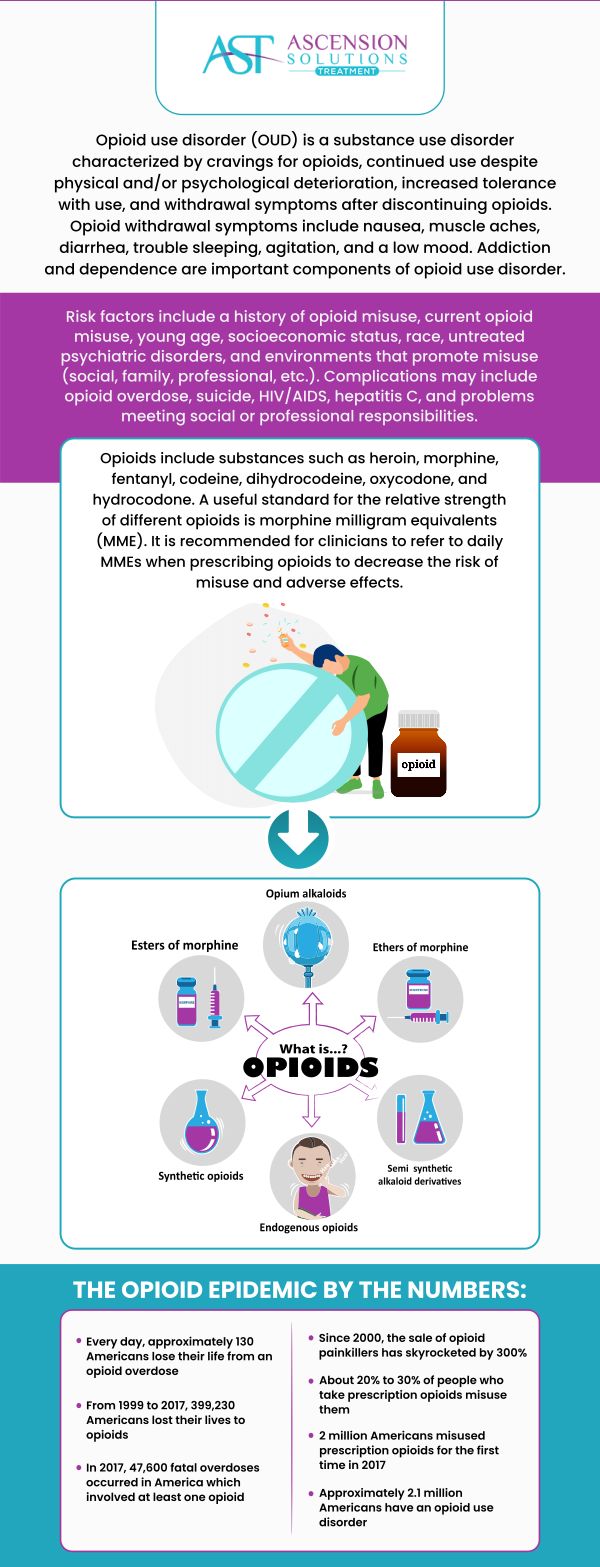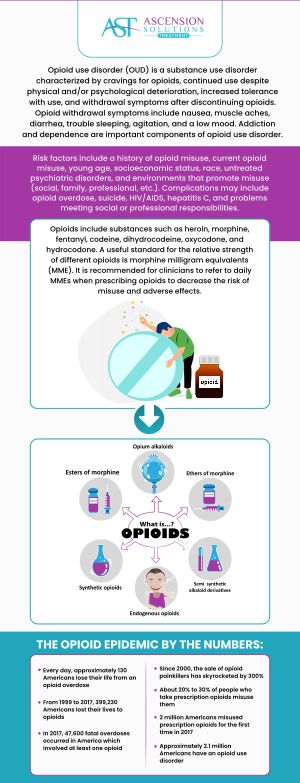Opioid Use Disorder Treatment in Peachtree Corners, GA
Opioid use disorder can be a challenging condition, but with the right treatment, recovery is achievable. Dr. Jonathan Hall, MD, offers personalized care for opioid use disorder. Using evidence-based approaches, Dr. Hall provides a comprehensive treatment plan that combines medication, therapy, and support to help you regain control of your life and health. His compassionate care and tailored strategies are designed to address both the physical and emotional aspects of addiction, ensuring a holistic path to recovery. If you’re ready to take the first step toward healing, Dr. Hall is here to guide you through the process with expertise and understanding. For more information, contact us or request an appointment online. We are conveniently located at 3780 Holcomb Bridge Road Suite D2, Peachtree Corners, GA 30092.




Table of Contents:
What do opioids do to a person?
Is opioid use disorder an addiction?
What are the common side effects of opioid use?
What is the best treatment for opioid use disorder?
How Dr. Jonathan Hall, MD Provides Effective Opioid Use Disorder Treatment at Ascension Solutions Treatment Center in Peachtree Corners, GA
Opioids can safely help you manage acute pain, such as pain after surgery when used as prescribed by your doctor. Incorrect use of the medications, however, can cause risks.
An opioid is a pain-relieving drug that interacts with opioid receptors on the surface of your cells. Opioids travel through your bloodstream and attach to opioid receptors in your brain cells, which release signals that reduce your perception of pain and increase your pleasure.
The same properties that make opioids effective for treating pain can also make them dangerous. Lower doses of opioids may make you feel sleepy, but higher doses may cause breathing and heart rate to slow, leading to death. The pleasure you experience when you take an opioid can lead you to want to continue experiencing those feelings, which can lead to addiction.
If you follow your doctor’s instructions carefully and take your medication as directed, you can reduce your risk of dangerous side effects. All other medications and supplements you are taking should be disclosed to your doctor.
Opioids can lead to opioid use disorder, which is an addiction, in anyone who takes them. Personal history and length of use of opioids play a role, but no one can predict who will become dependent on or abuse these drugs.
A person who is addicted to something feels they can’t live without something that started as pleasurable. According to doctors, drug addiction is characterized by an irresistible desire to use a particular drug, habitually using the drug, and continuing to use it even though it has harmful consequences over time. Because opioids activate powerful reward centers in your brain, they are highly addictive.
Endorphins, the brain’s feel-good neurotransmitters, are released when opioids are ingested. Pain is muffled by endorphins and pleasure is boosted, creating a temporary feeling of well-being. Once an opioid dose has worn off, you may find yourself longing for those good feelings again. An addiction may be in the making at this point.
Among the side effects of opioid administration are sedation, vomiting, constipation, dizziness, nausea, tolerance, physical dependence, and respiratory depression. Physical dependence and addiction are constant concerns when it comes to opioid usage.
Addiction to opioids or opioid misuse is capable of causing side effects that are damaging in all aspects of an individual’s life. Misuse is capable of causing individuals to take too many opioids, take opioids in ways other than were intended, use the medicine to achieve a high, and various drug-seeking behaviors.
To treat substance use disorders, medication-assisted treatment (MAT) uses medications in conjunction with counseling and behavioral therapies. MAT programs are clinically driven and tailored to meet the needs of each patient. MAT medications are approved by the Food and Drug Administration (FDA).
MAT can help sustain recovery for some people struggling with addiction by using a combination of medication and therapy. Overdoses caused by opioids can also be prevented or reduced with MAT which can make it a potentially life-saving treatment.
Prescription pain relievers and heroin are two common opioids that are treated with MAT. A prescription medication normalizes brain chemistry, blocks the euphoric effects of alcohol and opioids, relieves physiological cravings, and normalizes body functions without causing negative or euphoric side effects. Clinically, MAT has demonstrated its effectiveness in reducing the need for inpatient detoxification for these individuals. In MAT, medication and behavioral therapy are combined into a more comprehensive, individualized program, creating the best outcomes for opioid use disorder treatment.
At Ascension Solutions Treatment Center, Dr. Jonathan Hall, MD, delivers comprehensive care for patients facing opioid use disorder. His treatment model integrates medication-assisted therapy, behavioral support, and structured follow-ups to ensure each patient receives individualized, long-term care.
Dr. Hall’s patient-centered philosophy prioritizes accessibility and compassion. He tailors every treatment plan to meet the patient’s lifestyle, reducing relapse risk and promoting sustainable recovery. Patients trust Dr. Hall for his medical expertise and unwavering commitment to helping individuals rebuild confidence and independence.
For more information, contact us or request an appointment online. We are conveniently located at 3780 Holcomb Bridge Road Suite D2, Peachtree Corners, GA 30092. We serve patients from Roswell GA, Dunwoody GA, Johns Creek GA, Duluth GA, Norcross GA, Pittsburg GA, and Alpharetta GA.

Check Out Our 5 Star Reviews



Additional Services You May Need
▸ Addiction
▸ Medication Assisted Treatment
▸ Suboxone Treatment
▸ Behavioural Therapy
▸ Detox
▸ Vivitrol
▸ Sublocade
▸ Buprenorphine
▸ Depression
▸ Anxiety Disorder
▸ Subutex
▸ Alcohol Detox
▸ Brixadi
▸ Regenerative Medicine
▸ Ozone Therapy
▸ Spravato Treatment
▸ Hormone Replacement Therapy






